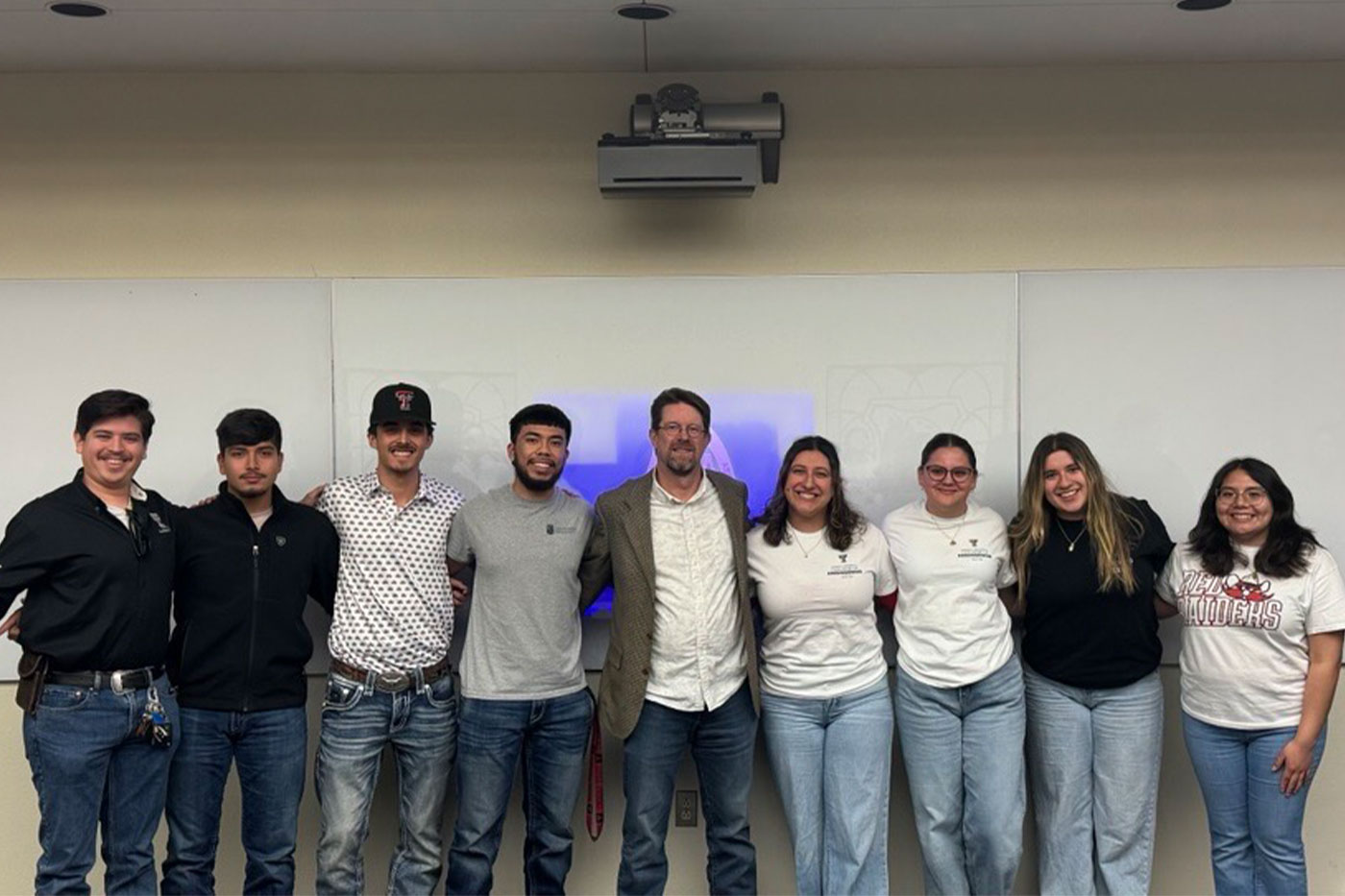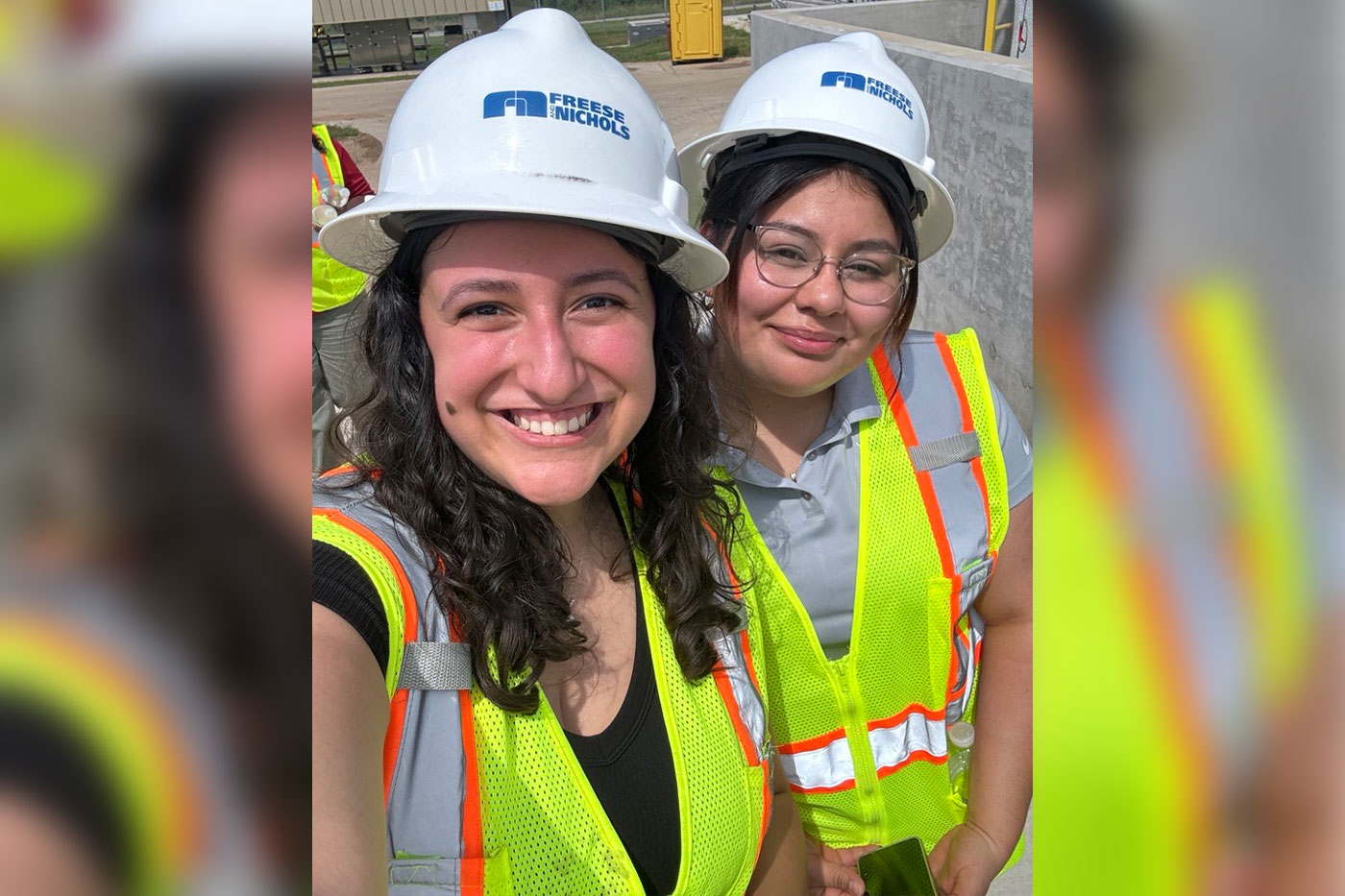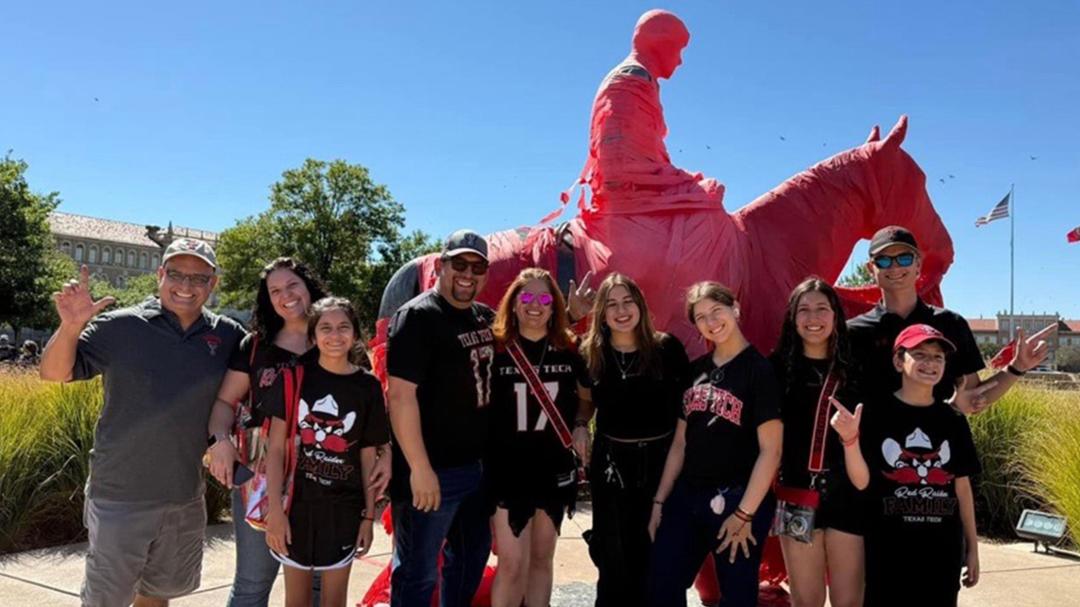Like materials tested at their limits, working engineering students discover their resilience with proper structural support from the Brookshire Scholarship.
When Isabella Falcon Gonzalez talks about the Department of Civil, Environmental & Construction Engineering at Texas Tech University, her entire demeanor transforms.
Her face lights up, and her words accelerate with excitement.
“I have something to show you,” she says, pausing mid-conversation and enthusiastically rummaging through her backpack.
She pulls out a small piece of metal from her pencil bag. It is clear it has been subjected to significant stress and broken under pressure during an experiment.
“This part was originally intact,” she explains, handling the broken metal with care. “But as you pull on it, and as force is applied, it begins to deform. You’re essentially pushing it to its limits to see how much force it can withstand before it breaks.”
As she turns the metal piece in her hand, she explains it came from her solids lab last semester.
“We did this lab where we tested stress and strain,” she continues. “This piece came with another end, which my lab partner kept. We basically pulled it until we hit the max resistance, and it just broke. We measured exactly how much force we applied and the elongation of the piece.”
Her enthusiasm does not stop there. She flips over her engineering calculator to reveal another classroom souvenir. Two rectangular, metallic foil objects, called strain gauges, were carefully taped to the back.
“My friend thought it was silly to keep them, but I absolutely love it,” she shares with delight.
She eagerly shows a video she recorded during the lab.
“We used these for a Coke can experiment where we soldered wires onto them to measure the pressure inside the can,” she explains. “See how the numbers change when we open the can? Those are the actual pressure readings.”
When asked why this subject excites her so much, her response reveals her curiosity.
“I think it’s because these are forces we don’t usually think about,” she said. “Everything experiences stress and pressure, but there’s always more to learn about it. Even when I think I’ve wrapped my head around a concept, there’s still so much more depth to discover.”
Just like the materials with which she is so enraptured, Falcon and many other students in the Edward E. Whitacre College of Engineering understand what it is like to work under pressure and be stretched to their limits. In addition to the rigorous coursework and lab work that engineering students must complete to earn their degree, many students also balance a work schedule of 20 hours or more per week to fund their education.
It was here that the William A. Brookshire Foundation identified an opportunity to make a meaningful impact on students’ lives. In 2024, the foundation established the S&B Engineers and Constructors Scholarship, which, during the 2024-2025 academic year, provided $7,500 per academic year to 10 juniors and seniors in the College of Engineering who had a combined enrollment and working hours of 30 hours or more per week.
For Falcon and the other students, the S&B Engineers and Constructors Scholarship did not just ease their financial burden; it validated their path as working students and transformed their college experience. It prevented a promising but often overlooked student population from reaching the breaking point and provided the best conditions for these students to explore their full potential.
Blueprint for Success
With both of her parents in science, technology, engineering and math (STEM) fields, it is no surprise Falcon followed suit. She has always been eager to fix things, but her passion for engineering emerged in middle school from a pretty ordinary Texas experience.
Every day, on her way to school, she would pass a bridge that had been under construction for what felt like forever.
With a big sigh, she recalled thinking each time she saw it, “When are they going to be done with construction?”
Her parents were quick to rebut the age-old question and explained the delays were likely caused by the engineer overseeing the project rather than the construction workers.
“I want to fix the process and make it go faster,” said Falcon. “I wanted to be like them. I wanted to be an engineer.”
When she started high school, she joined the STEM academy where she took all the engineering courses she could manage. She even enrolled in community college courses to knock out her English and history classes, freeing up more space for engineering coursework. In addition to the STEM Academy, she attended Texas Tech’s Explore Engineering summer camp between her junior and senior years of high school.
“After my experience with the summer camp, that’s what solidified my choice,” Falcon said. “Not only was engineering calling me, but I knew that Texas Tech was the place where I wanted to learn more. That’s when I said, ‘I’m going to go to Texas Tech!’”
As a second-generation Red Raider, Falcon has deep ties to Texas Tech. Both her parents and several other family members graduated from the university. She remembers visiting the campus when she was 6 years old and taking photos with the Texas Tech seal. However, the decision to attend Texas Tech was not solely based on a family tradition.
“I toured several colleges, and Texas Tech was the only one where I felt like there were people who understood me and wanted me to be here,” she explains. “There was a strong community that gave me a sense of belonging.”
Financial considerations also played a crucial role in her decision. The high cost of college education presented a significant challenge.
“Texas Tech was the only college I remember that openly talked about the scholarships that they offered,” she said. “I was working at The Gap at the time, so the cost of Texas Tech’s tuition was the most manageable for me.”
Calculating the Load
Falcon and her parents decided early that she would not work during her first semester so she could focus on her studies. Her parents knew the struggles of balancing work and a full course load during college.
“They’ve always told me, ‘School is first. If we need extra money, we’ll figure it out,’” she said.
To support herself while staying true to her parents' wishes, she took advantage of opportunities to work during school breaks to save as much as possible before heading back to campus. However, it quickly became clear she would need additional income, so Falcon began seeking on-campus employment opportunities.
She started at College Connect, a Texas Tech program partnering with kindergarten through eighth-grade schools to promote higher education. She then discovered the First-Generation Red Raiders Peer Mentor program, where her positive attitude and enthusiasm made her a perfect fit despite not being a first-generation student. In addition to her paid positions, she also volunteered in the Engineering Ambassadors program, creating community as an ambassador for the college.


“That was the time I held two jobs at once, and I was working over 20 hours a week in addition to 18 credit hours at school,” she said. “It was a lot of pressure having to continue going on like that.”
Stress Concentration Factors
Falcon’s experience reflects a reality faced by many college students. Currently, around 60% of students in the Whitacre College of Engineering work while maintaining their status as full-time students. While this can be necessary to alleviate the financial burden that comes with attending college, it can carry a social stigma. One that she has experienced herself.
“During group projects (outside of my major), I’ve had people say, ‘You’re behind on stuff,’” she said. “I explain that I haven’t started the homework because I’ve been working. I work until five or six, so I have the afternoons, but many people do the opposite. Some go to school and then work afterward, making it harder for them to attend group meetings and complete assignments.”
This type of pressure from peers, coupled with a full schedule, can push anyone to their limit.
“I’ve had many instances where I just get to the point where I think, ‘I can’t do it anymore,’” she admits.
However, support from faculty, staff and friends in her program proved to be the encouragement she needed to persevere.
“Texas Tech has a community that is very positive,” she said. “It’s never, ‘You can’t do this.’ It’s always, ‘Let’s see what’s good for you.’ And if it works, the community continues to push and support you. It just solidified for me that, ‘Yeah, I should keep going and get through it.’”
Building Reinforcements
The S&B Engineers and Constructors Scholarship, which would play a pivotal role in Falcon’s success, has its roots in a story like her own. William Brookshire, fondly known to his family and friends as Dr. Brookshire, was a first-generation college student. In addition to founding the William A. Brookshire Foundation, he was also the co-founder and chairman of S&B Engineers and Constructors, Ltd., an engineering and construction company based in Houston.
As the first member of his family to earn a high school diploma, Dr. Brookshire pursued higher education. He supported himself through school by working full-time during the day and attending night school, earning his Bachelor of Science in Chemical Engineering from the University of Houston. He then attended Louisiana State University on a fellowship, earning a master’s degree and Ph.D. in chemical engineering.
Drawing from his own experience, the foundation was established to help students who support themselves through school and need additional assistance to succeed. Specifically, the S&B Engineers and Constructors Scholarship supports juniors and seniors who have a combined enrollment and working hours of 30 hours or more per week.
The foundation has supported countless working students at other universities, but the foundation members recognized an opportunity to support students at Texas Tech. Dean Quinn, a two-time Texas Tech alumnus who serves as executive vice president, general counsel and secretary for S&B Engineers and Constructors and a director of the William A. Brookshire Foundation, facilitated the connection between the Brookshire Foundation and the university. Lori and John Garrison, Dr. Brookshire’s daughter and son-in-law, believe in Texas Tech students’ character and hard work and that they are the types of students Dr. Brookshire would want to support.
Aside from Quinn’s personal ties to Texas Tech, the foundation recognized the university’s strong engineering program and reputation for producing hardworking students. The partnership aligns with the university’s mission and the foundation’s goals of supporting hardworking students who demonstrate self-sufficiency. With more than half of the Whitacre College of Engineering student population working while maintaining full-time academic schedules, there was a clear need for support.
“Dr. Brookshire believed in hard work and lifting up those who are striving to lift themselves up,” Quinn said. “The success stories of students who have benefited from his generosity are endless. My regret is that the Red Raiders supported by his foundation do not have the chance to meet him. He loved meeting the students he helped, learning about them and their dreams.”
Load-Bearing Support
Before establishing the scholarship, foundation representatives visited Texas Tech for an intimate roundtable discussion with several engineering students who were balancing school and work. During this meeting, foundation members engaged with students to learn how to best support and serve this population. They heard about students’ backgrounds, work experiences, academic challenges and extracurricular activities.
The students were able to share candidly how scholarship support could transform their college experience. They explained that such a scholarship would allow them to reduce work hours while staying on track to graduate on time. Many highlighted how additional free time would enable them to join student organizations, build community connections and participate in undergraduate research – opportunities that could open pathways to graduate school.
Based on this feedback, the foundation created a first-of-its-kind gift at the university, providing $7,500 scholarships to 10 working juniors and seniors per academic year. To identify the students most in need, the application process was designed to be accessible, with only a few short essay responses and proof of employment.
“These students are performing strongly, giving everything they have,” said Jamie Perez, the S&B Engineers and Constructors Scholarship coordinator. “It’s so nice to see them get this kind of attention and have someone come in and believe in them. This group is often forgotten because they don’t have the opportunity to spend as much time on campus. So, for the foundation to come in and say, ‘I believe in you. I’m investing in you,’ is so special.”
Reducing the Strain
In summer 2024, after finishing the day at her internship with Freese and Nichols, a privately owned engineering, planning and consulting firm, Falcon received a call from Perez about a new scholarship specifically for working students.
“I was sitting in my car with the engine still running,” she recalled. “After reading the scholarship description, I realized, ‘This is for me,’ and applied right then and there. I wasn’t really expecting much. I had put out many applications for scholarships and rarely hear back.”
In September 2024, while doing homework at her aunt’s house with her mom working on paperwork, she received an email with “Congratulations!” in the subject line. It was a message to inform her she had been selected as a S&B Engineers and Constructors Scholarship recipient. When she checked her account and saw the $7,500 award, she and her mother burst into tears of joy.
Measuring Results
Beyond financial assistance, the scholarship provided something equally valuable: assurance and validation.
“One of the most important impacts we’ve seen is the confidence that comes with being selected,” said Perez. “Of course, our students need financial assistance, but what comes behind that is belief and encouragement. The scholarship shows these students that someone believes in them.”
For Falcon, this recognition created a sense of accountability and belonging.
“I think of it as, ‘They did their part; now it’s time for me to do mine,’” she said proudly. “Even when I start having doubts, I think back to when we signed a picture frame for them. To me, it was like promising to finish what I started.”
The scholarship has also allowed her to focus on the community that drew her to Texas Tech in the first place. She now helps with the same Explore Engineering camp she once attended and particularly enjoys the fall Engineering KickOff event.
“I love whenever I meet freshmen before (Engineering) KickOff happens,” she said. “I tell them, ‘Go to KickOff. If you don’t know where you want to be, go to KickOff. You’ll find your group there, no matter what.’”
Additionally, she participates in the Society of Hispanic Professional Engineers and the American Society of Civil Engineers, where she holds leadership positions. She also co-founded and serves as president of the Texas Tech chapter of the Structural Engineers Association of Texas.
Engineering the Future
With her graduation approaching in December 2025, Falcon is looking to her future with a renewed sense of confidence. The possibilities for what’s next in her journey are endless.

“My goal is to end up somewhere in the Dallas-Fort Worth area because there are many structural engineering opportunities there,” she said. “But ultimately, I want to go somewhere I can continue to grow. I want to constantly keep learning.”
The support she has received from Texas Tech and the Brookshire Foundation has encouraged Falcon to pursue advanced degrees. She is applying to master’s programs but is also looking further ahead to doctoral programs.
“I’m very interested in researching things that haven’t been fully explored yet,” she explains. “But I also plan to get a full-time job because I understand that learning happens in the classroom and through hands-on work.”
Distributing the Force
The Brookshire Scholarship’s impact extends far beyond financial aid for a single student. For Falcon and students like her, it is the difference between struggling to stay afloat and having the freedom to see their true potential through.
“I don’t think they’ll ever truly know the impact they have,” she said, reflecting on the scholarship donors. “A lot happens behind closed doors, and what they’re doing doesn’t affect just one person; it affects my entire family.”
Thanks to the continued generosity of the Brookshire Foundation, this impact and the number of people affected will now be greater than ever before. In March 2025, the foundation renewed its commitment to Texas Tech and the Whitacre College of Engineering, doubling its scholarship support from 10 to 20 students annually.
In addition to this gift, the foundation also cemented its support of veterans at Texas Tech’s School of Law. Following their founding of the Texas Tech School of Law Veterans Clinic in April 2024, the foundation’s most recent gift also established the Brookshire-Quinn Scholarship for Veterans, which will support every veteran attending law school at the university.
For Falcon, the scholarship’s most profound impact might be the confidence it instilled when doubts threatened to derail her journey.
“The way I sign off all my thank-you letters is, ‘Because of you, I feel like I have more people behind me to help me reach my goal,’” she said. “Knowing how many people are in my corner, wanting me to succeed, overshadows everyone who asks, ‘Are you sure you want to do this?’
“They see the passion I have. Even though most donors don’t get to see that passion firsthand, I hope they can read about it. What they’re doing helps me believe in myself more than if I were just going through this alone.”

